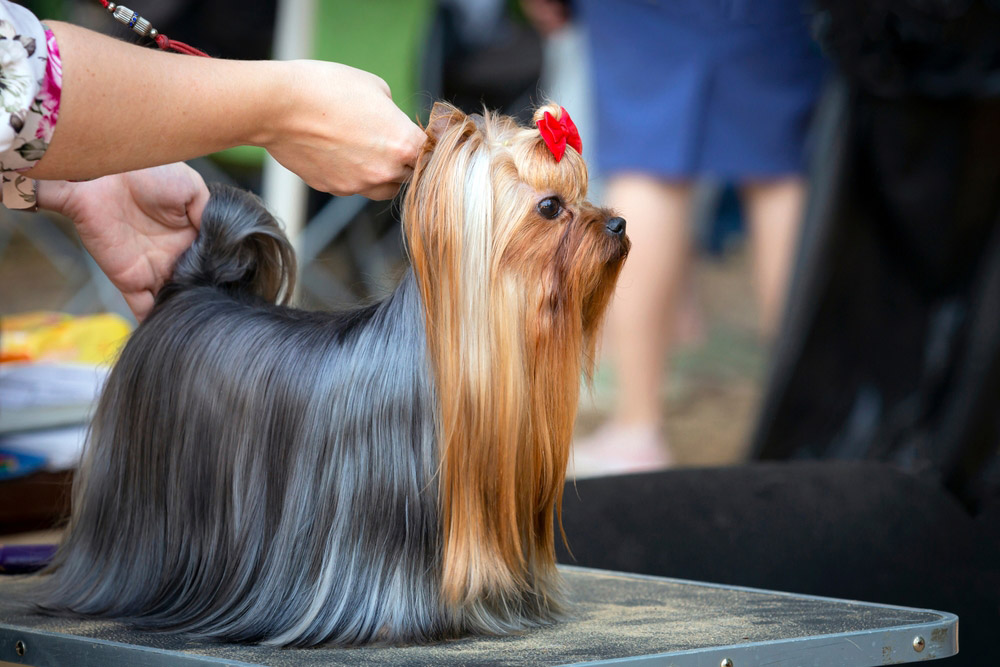Yorkies are pleasantly easy to own for a broad assortment of pet lovers, partly due to their size and personality and partly because of their flowing low-shedding coats. Allergy sufferers tend to get along better with these diminutive dogs than they do with many other breeds. Yet, while they’re generally considered a hypoallergenic breed, Yorkshire Terriers still shed regularly.
The Yorkie’s relatively low-shedding coat requires a more involved grooming routine, a common trade-off in many dog breeds. We’ll explore the extent of a Yorkshire Terrier’s shedding and whether they’re as hypoallergenic as we like to believe.

Yorkshire Terrier Coat Characteristics
The Yorkshire Terrier is instantly recognizable in the show ring thanks to their adorable top knot and glistening, floor-sweeping coat. The coat is similar to human hair. It has long, fine strands and lacks the short, quick-shedding undercoat that defines double-coated breeds.
Double-coated dogs like Huskies or German Shepherds shed constantly and in high volume, covering their homes in fur throughout the year. When the seasons change, they blow their undercoat heavily. Spring is the heaviest coat-blowing period, as dogs lighten their coats to manage the warm weather and make way for new seasonal growth, demanding significant grooming and house-cleaning.
Yorkshire Terrier’s silky hair lacks this undercoat, so owners happily avoid any heavy shedding periods.

Do Yorkshire Terriers Shed?
Yorkshire Terriers may lack an undercoat, but they still shed hair. As dogs develop and maintain their bodies, the regular turnover of dead hairs to make way for new growth is a critical process.
With Yorkies, much of this hair falls back into the coat, and you can remove it in a controlled grooming session. Other hairs fall onto the ground, furniture, and anywhere else your dog frequents, but the buildup tends to be minimal compared to other breeds.
Low-shedding coats are a general hallmark of Terrier breeds. Since Yorkies grow much longer hair than many other dogs (and grow it continuously), the rate at which they must replace dead hair is relatively low.
When Do Yorkies Start Shedding?
Yorkshire Terrier puppies have a unique shedding period beginning at around 4–6 months. They lose their puppy coat, a thick and fuzzy layer, and transition to their silky, human-hair-like adult coat soon after.
At this time, the adult coat often blends with the puppy coat, allowing it to tangle and mat easily. Extra brushing and trimming can help manage the coat during this transition.




Factors Affecting How Much Yorkies Shed
Yorkies are generally a low-shedding breed, but each dog can vary in how much they release. Some of this is due to genetics, a factor owners can’t control, while lifestyle aspects can also have an impact. The following are essential reasons some Yorkies may shed more than others.
Diet
Feeding a Yorkie a balanced, complete diet is critical in ensuring their overall health and, subsequently, coat strength. Food rich in antioxidant vitamins and minerals can prevent damage to the skin and hair, while omega fatty acids can nourish, strengthen, and soften the body, promoting less hair loss.
Dietary intolerances can also affect hair loss in Yorkies. Even though your dog may be eating a nutrient-rich food that meets the AAFCO guidelines, they could have an allergy or intolerance to various components, such as dairy, certain meats, grains, or soy.
Allergic reactions can cause inflammation in the gut, hampering nutrient absorption and leading to poor body condition and coat quality. If your dog gets itchy skin, their coat can suffer, and the constant scratching can make them lose an excessive amount of hair.
Disease
Illnesses, particularly those affecting their hormones and immune system, may contribute to abnormal hair loss in Yorkshire Terriers. Common examples include hypothyroidism (underactive thyroid glands) and Cushing’s disease, an illness caused by excessive cortisol production. Many diseases appear later in life, typically when the dog reaches middle age.
Some Yorkies and dogs of other breeds, including Chow Chows, Dachshunds, and Doberman Pinschers, can also suffer a rare condition called color dilution alopecia. The genetically inherited condition affects areas with diluted pigments, causing hair to become brittle and loose.
Although Yorkies are born with normal hair, they may experience abnormal hair loss in darker coat sections between 6 months and 3 years of age. This hair loss can be attributed to various factors such as stress, pregnancy, infections, and grooming practices. Stress, anxiety, and nervousness can trigger hair loss in Yorkies by stimulating the release of hair when they over-produce adrenaline. Pregnant Yorkies and those in heat may also experience hormonal changes that lead to hair loss, which typically resolves after giving birth. Infections caused by parasites, bacteria, or other agents can also contribute to hair loss in Yorkies. Proper grooming, including regular brushing, bathing, and coat maintenance, is essential to prevent excessive shedding in Yorkshire Terriers. Additionally, Yorkies are considered hypoallergenic to some extent due to their minimal shedding and drooling, which helps reduce household allergens. By maintaining a consistent grooming routine and overall health, Yorkie owners can enjoy the companionship of these energetic and low-shedding dogs while keeping household cleaning needs to a minimum. The instructions are unclear. Can you please provide more context or specific details for me to rewrite? article without changing its meaning:
The company is introducing a new line of products that are specifically designed to meet the needs of its younger customers. These products are a response to the increasing demand for technology-driven solutions among millennials. The company hopes that this new line will help attract more young consumers and boost its sales in the coming months.

